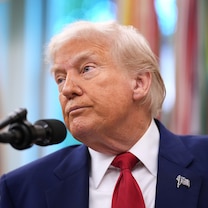Surrogate Wars: '08 Faceoff
Senators preview arguments candidates will make in the fall.
April 2, 2008 — -- The top surrogates of the White House wannabes explored their opponents' vulnerabilities at a breakfast debate Wednesday in Washington, D.C., hinting at the arguments their candidates will make against each other this Fall.
With three senators locked in an ongoing battle for the White House, their colleagues in the U.S. Senate have carefully picked sides — a task made more difficult for the Democratic senators by the split between Sen. Barack Obama, D-Ill., and Sen. Hillary Clinton, D-N.Y.
Asked how Clinton would heal the Democratic party's path to the White House should she win the Democratic nomination, Sen. Evan Bayh, D-Ind., a Clinton supporter, suggested Clinton should ask Obama to be her vice-presidential nominee.
"I think she needs to first reach out to him directly, possibly ask him to be her running mate if that seems appropriate, that seems the most obvious step," said Bayh, who was once rumored to be a potential vice-presidential candidate for Clinton. "He's obviously a tremendous individual."
Clinton has hinted that she would entertain asking Obama to be her vice-presidential pick if she won the nomination — a move dismissed as political posturing by Obama, who is currently leading in state victories, the popular vote, and ABC News' delegate count.
The race is so close that neither Clinton nor Obama can reach the 2,024 delegates necessary to clinch the Democratic nomination before the convention in August. But Bayh holds out hope that a clean victory can still be accomplished. "Winning the nomination is foremost in our minds," said the Clinton supporter.
"I think she needs to do very well in these closing 10 primaries and caucuses and we need to total up the popular vote when this is done," Bayh said, noting the party also has to figure out how to deal with the Michigan and Florida delegates that have been excluded after the party and states squabbled about primary voting dates.
But Obama supporter Sen. Dick Durbin, D-Ill., countered that the Obama campaign has "rewritten the rules" of politics in America, pointing to 250,000 new Democratic voters registered in Pennsylvania and one million donors to his campaign so far.
"What Barack Obama has done is to really unleash a new brand of politics," Durbin said. "There has been a surge of interest in the Democratic Party."
The Democratic senators argued that the presumptive Republican nominee, their longtime Senate colleague John McCain, R-Ariz, is a candidate they can beat.
"John is a good guy but he has sort of embraced the Iraq policies of George Bush and the economic policies of Dick Cheney and that is not really a winning combination for the fall campaign," Bayh said.
But McCain supporter Sen. Lindsey Graham, R-S.C., argued against that notion. "To say John McCain is Dick Cheney is a bit of a stretch," Graham said.
"He's not going to run away from President Bush but at the end of the day, John McCain has earned a reputation, and has the scars to show it, of doing things that put the country ahead of party," Graham said, noting McCain has differed with the party on immigration, his desire to close Guantanamo Bay, and enacting robust climate change policies.
"Climate change is the road less traveled but he's traveled it even more than Al Gore," Graham said. "Al Gore has talked about it and deserves great recognition but he was around here a long time and never introduced a bill."
McCain and Sen. Joe Lieberman, D-Conn., co-sponsored a failed Senate bill in 2003 that would have capped greenhouse gas emissions levels.





